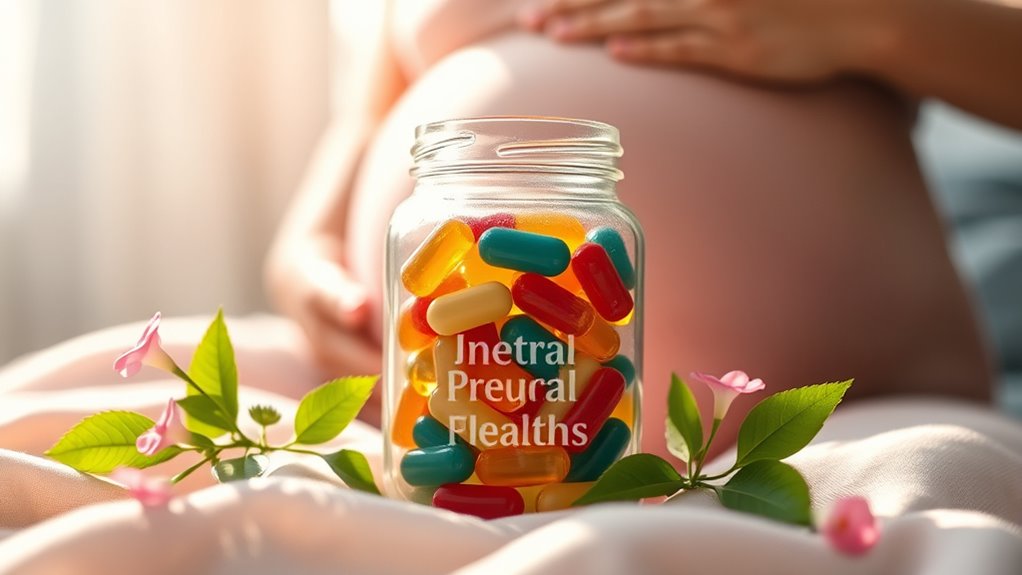Prenatal vitamins are vital for your health and your baby’s growth during pregnancy. They provide essential nutrients like folic acid, iron, and calcium, which many diets lack. These vitamins help prevent serious conditions, support overall health, and reduce risks like preterm birth. A balanced diet is important, but prenatal vitamins ensure you meet your nutritional needs. Choosing the right supplement can make a difference, and there’s more you can learn about optimizing your prenatal health.
Key Takeaways
- Prenatal vitamins provide essential nutrients that support the health of both the mother and developing baby during pregnancy.
- Folic acid in prenatal vitamins helps prevent serious neural tube defects in the fetus.
- Iron supplementation reduces the risk of anemia in pregnant women, supporting red blood cell production.
- Calcium and vitamin D are crucial for fetal bone development and reducing complications like preeclampsia.
- A balanced diet is important, but prenatal vitamins help fill nutritional gaps often found in women’s diets during pregnancy.

When you’re preparing for pregnancy, taking prenatal vitamins is crucial for your health and your baby’s development. These supplements are specifically designed to support the health of pregnant women and their developing babies by providing essential nutrients that might be lacking in your diet. Key components like folic acid, iron, calcium, and vitamin D play vital roles in ensuring both you and your baby stay healthy throughout pregnancy.
Folic acid, for instance, is essential for preventing neural tube defects, which can occur very early in pregnancy. By supporting the formation of the neural tube, folic acid can help reduce the risk of serious conditions like spina bifida. Iron is equally important, as it helps prevent anemia and supports the growth of red blood cells in both you and your baby. This is especially critical during pregnancy when your blood volume increases.
Folic acid is vital for preventing neural tube defects, while iron supports healthy blood growth during pregnancy.
Calcium supports fetal bone development and helps maintain your bone health, while vitamin D can help reduce the risk of complications like preeclampsia and preterm birth. Additionally, it is important to note that prenatal vitamins are designed to supplement a healthy diet rather than replace it, ensuring that all nutritional bases are covered.
The Centers for Disease Control and Prevention (CDC) recommends all women of reproductive age take prenatal vitamins, emphasizing their importance even before conception. Starting these vitamins early ensures your body is adequately nourished right from the beginning of your pregnancy. Unfortunately, many pregnant women find that their dietary intake alone doesn’t meet their nutritional needs; studies show that around 90% require supplements to fill those gaps.
While prenatal vitamins are beneficial, it’s essential to choose the right one. Not all prenatal supplements contain the optimal levels of nutrients. Brands vary significantly in their formulations, and only a small percentage provide the recommended doses. Therefore, it’s wise to consult with your healthcare provider to find a prenatal vitamin that aligns with your specific nutritional needs.
Timing matters too. Consistent dosing throughout your pregnancy is recommended, though some nutrients like iron might have specific guidelines. It’s crucial to ensure that you’re taking the right vitamins at the right time to maximize their effectiveness.
Inadequate nutrition during pregnancy can lead to serious risks, including preterm birth and low birth weight. By committing to a prenatal vitamin regimen, you’re taking proactive steps to protect both your health and the health of your baby.
Frequently Asked Questions
Can I Take Prenatal Vitamins if I’m Not Pregnant?
Yes, you can take prenatal vitamins even if you’re not pregnant.
They provide essential nutrients that can benefit your overall health, prevent deficiencies, and support skin, hair, and nail health.
However, it’s important to consider your individual nutritional needs and potential risks of overconsumption.
Before starting any supplement, it’s wise to consult with a healthcare provider to determine if prenatal vitamins are right for you.
How Soon Should I Start Taking Prenatal Vitamins?
You should start taking prenatal vitamins one to three months before trying to conceive.
This early start helps optimize your nutrient levels, supporting both your health and the development of your future baby.
The American College of Obstetricians and Gynecologists recommends beginning at least one month prior to pregnancy.
If you haven’t planned your pregnancy, it’s still beneficial to begin taking them as soon as you find out.
Your body will thank you!
Are There Any Side Effects of Prenatal Vitamins?
Yes, there are side effects of prenatal vitamins. You might experience nausea, constipation, or stomach upset, especially if you take them on an empty stomach.
Some people also report diarrhea or vomiting. Less common effects can include hives, muscle weakness, or tingling sensations.
If you notice any severe reactions or if the side effects persist, it’s important to consult your healthcare provider for guidance and possible alternatives.
Can I Get Enough Nutrients From Food Alone?
You can’t always get what you need from food alone, especially during pregnancy.
While a balanced diet is important, dietary limitations and increased nutrient demands can make it tough to meet your needs. Some nutrients, like DHA, are hard to find in sufficient amounts.
Plus, digestive issues and food restrictions can complicate things. That’s why it’s often recommended to consider supplements to ensure you’re covering all your bases for a healthy pregnancy.
Do All Prenatal Vitamins Contain the Same Ingredients?
No, not all prenatal vitamins contain the same ingredients. They can vary significantly in nutrient levels and formulations.
While many include essential nutrients like folic acid, iron, and calcium, some might add extras like choline or omega-3 fatty acids.
It’s crucial to read labels carefully to ensure you’re getting the nutrients you need.
Depending on your dietary preferences, you might find options that cater specifically to your requirements, like vegan or gluten-free formulations.
Conclusion
In conclusion, taking prenatal vitamins is crucial for both you and your baby’s health. They provide essential nutrients like folic acid, iron, and calcium, which support your baby’s development and help prevent complications. Why wouldn’t you want to give your little one the best start possible? By prioritizing these vitamins, you’re not just nurturing your baby; you’re also taking care of yourself. So, make prenatal vitamins a part of your daily routine and embrace this exciting journey!









